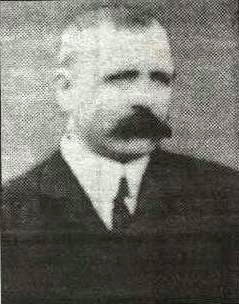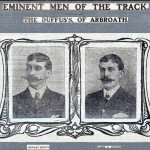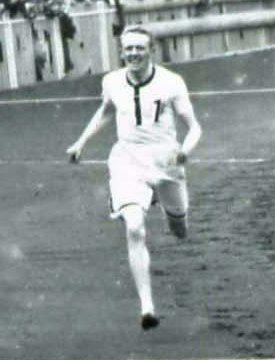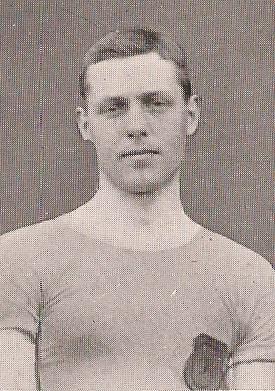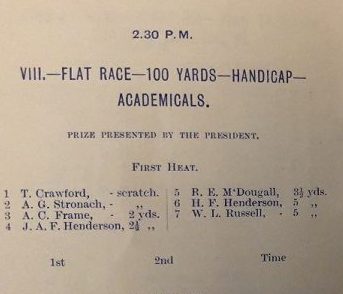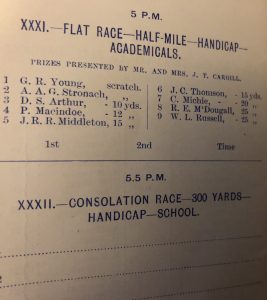Andrew Hannah
To set the scene: in 1896 Clydesdale Harriers had split with the SAAA and the SCCU and were running their own competitions and championships. The championships of both SAAA and SAAU were both being held on 27th June which would have bee the date of the Clydesdale Harriers Sports. The sports were therefore brought back by two weeks. They were held at Ibrox Park on 13th June in 1896 and according to the club handbook only just managed to make ends meet owing to a very poor turn out of spectators.
The ‘Glasgow Herald’ reported: “Every sports holding club must after this steer clear of Lifeboat Saturday. If they don’t their experience will be as melancholy as that of the Clydesdale Harriers. No club, perhaps, has suffered more from demonstrations than the Clydesdale Harriers. Several years ago Mr Gladstone in one of his political pilgrimages visited the city on the same as Clydesdale Harriers were holding their annual sports with the result that Ibrox was almost deserted; while on Saturday, owing chiefly to the nautical spectacle, that ground presented an equally forsaken appearance. All this is very hard on the Clydesdale who have done so much in their honourable career to promote the best interests of athletics, and who, like other clubs of a similar kind, look forward to reaping some little return from their yearly sports. But of the attendance was disappointing, the Clydesdale have the satisfaction of knowing that they have presented one of the most interesting athletic dishes that has been submitted to the Glasgow public this season. There was not a wide finish the whole afternoon.”
There were many very good races that afternoon but the best was the victory of Andrew Hannah in the three miles handicap where, as scratch man, he was not thought to be able to work his way through the field. Seventeen men started but by halfway ‘the field was considerably reduced’. The handicaps were big ones with the second placed runner being off a mark of 300 yards. The task for all the back markers was such that internationalists and Scottish champions Duffus and Robertson gave up halfway through the race. Hannah ran hard all the way and the victory was hailed as the best run of his career up to that point, a view which was confirmed by the enthusiasm of the spectators at the finish.
By now the Rangers Sports had moved to the date which will always be associated, the first Saturday in August, and in the absence of any demonstrations plus a good programme of athletics and cycling, they attracted a crowd of 14,000+.
The Clydesdale Harriers handbook for the year went on to say: “On 20th July (Fair Monday), we introduced another innovation in the shape of a Sports Meeting on the Coast. After due consideration, Dunoon was chosen as the venue, it being the only place a suitable field could be obtained, and although a goodly number turned out to witness the sports, very little profit was made of them, owing to the expense of putting the ground in order. The experience gained may be useful on another occasion. ”
The club held several meetings each year, some on its own account and others in co-operation with other clubs. The big one however remained the one in July.
*
A year later, on 3rd July, 1897, at Ibrox there was another tale of bad luck. The handbook: “The weather was anything but favourable and had great effect upon the gate, in consequence of which the meeting incurred a loss. Interest was added to the meeting by putting up a Challenge Cup and Badges for Team Competition: and the club’s own Team was successful in winning. Special thanks are due to the Committee of Rangers FC for their generosity in handing over to us the sum of £10, being the major part of the drawings of the covered stand, which were to be retained by them.”
The Glasgow Herald waxed lyrical on the weather conditions on the day: “Ibrox Park is not by any means the best venue obtainable for a sports meeting when there is a wind on, and when, as was the case on Saturday, the breeze hails from the south-west, the enclosure of the Rangers FC gets the full brunt of it. Naturally therefore the racing at the Clydesdale Harriers Sports on Saturday afternoon suffered considerably from the gale that prevailed.”
There were several good races but none of the five English teams invited for the three miles team race appeared and the race was between Clydesdale and Watsonians with the CH proving victorious while Edinburgh Northern was third. There were many close finishes but the only athletics beneficiaries on the day were the 100 yards sprinters who were helped on their way and lots of good times were recorded. The list of officials does not include a wind gauge operator.
*
The bad luck and bad weather continued and on 2nd July, 1898 when Ibrox was favoured with ‘boisterous, showery weather’. The club secretary’s report said that ‘Ibrox Park was placed entirely at our disposal by Rangers FC’ He went on to lament the weather and said ‘The attendance was naturally of the most meagre description and income failed to meet the expenditure by about £25. Fortunately this sum was almost covered by a guarantee fund raised among the Committee and Members, so that very little loss on the Sports will be incurred by the club.’ It wasn’t just the sports that were affected of course – “the weather was all against cricket” for instance but that was small consolation to the club treasurer or to the athletes. The Glasgow Herald began its report on the meeting as follows: “This popular club, which for some years past had very bad weather for its annual gathering, was again on the shady side of fortune on Saturday last, the total drawings amounting only to £38 15s. The racing all over, however, was of a very high class, and the majority of the finishes of a most exciting description, the handicapping, especially in the flat events being very good indeed.”
There was the usual quota of bicycle races which were well supported – eg the half mile handicap had seven heats which sounds very good, and it is, but the athletes really supported the meeting. the 100 yards had twenty (20) heats, a second round of four heats and the final for the few witnesses on the terracing to enjoy. 25 100 yards races in the one afternoon! The standard was high – Hugh Barr was there again, for instance – and the race was won by Neil of Partick Harriers from Kirkwood of Clyde FC and Cooper of Ingram Harriers in 10.0. Not bad after three races on a bad day weatherwise. The two miles short handicap race was won by JS Duffus, from W Robertson and DW Mill. all of Clydesdale Harriers, all noted cross-country runners, in a time of 9:51.2. The half-mile was won by Lindsay of Vale of Leven AC from WW Mason (unattached). This is of interest to Scottish athletics buffs in that the Vale of Leven AAC that we know of as the home club of Lachie Stewart was only founded after the second world war. There were eight heats of the open 220 yards and the Mile was won by T Scott (EUAC) in 4:33. Interestingly, there were three cycle races of which two were for professional riders and one for amateurs.
In 1899, the club changed the date of the meeting from July to May 20th. Held as always at Ibrox, a profit was made that enabled them to pay all their expenses and still have a credit balance. “We had the honour of introducing to the Glasgow public the World’s Champion Hugh Welsh. A Five-a-Side Tournament (by some regarded as a relic of bye-gone days in so far as Glasgow is concerned) was also introduced, and judging by the enthusiasm evinced, could be counted as one of the successes. Vale of Clyde won the first prizes.”
A change of date, a top class athlete previously unseen by a Glasgow crowd and back to the future with a five-a-side brought the first profitable Sports for several years.
- The football competition was made up of Junior teams: the Junior football scene was well supported at the time – junior does not refer to the age of the players but to the fact that their leagues were only a little below that of Senior football. The teams involved were Vale of Clyde, Ashfield, Rutherglen Glencairn, Maryhill, Cambuslang Hibernian, and Glasgow Perthshire.
- Hugh Welsh was a genuine athletics celebrity. A member of the Watsonians club, he had won the SAAA half-mile and mile double in 1896 and 1897. setting a Scottish record in the latter of 4:24.2; in 1898 he won both half-mile and mile in the Irish international in Dublin; and would go on to do the triple in the SAAA championships in June 1899 of 440 yards, 880 yards and Mile. You can read more about him at this link
In the 1899 CH Sports, Welsh was running from scratch with fellow Watsonian JS Paterson off only 23 yards. Paterson was the reigning SAAA four mile champion and had been second in the four miles in the Irish international the previous year so it was no easy task for Welsh in the Clydesdale Harriers mile. He won in 4:30.2. It was “A grand race, the best seen in Scotland for many years, the champion showing excellent judgment. The time was certainly good considering the condition of the track.” Welsh and Paterson faced each other again in the half mile: Welsh started the half but did not finish because of an injury to his foot sustained in the Mile. Paterson won the race off 15 yards. Probably because of the CH Sports recent history, the ‘Herald’ reported that the drawings were: Gate £65 5s; Stand £10. The report ended with the remark that “The sport overall was of the best class and will do a lot to help athletics generally.”
Hugh Welsh
“The Annual Sports of the Club were held on June 16th, 1900. For once the elements were in our favour yet, notwithstanding the strictest economy, we had difficulty in making ends meet. The programme submitted was much as in previous years, the novelty of a Boys’ Race and a tug-of-war contest having to be abandoned through lack of entrants.”
The Glasgow Herald report was also very brief commenting that the sports were conducted in a business-like manner and reflected great credit on all concerned but the attendance was ‘far from satisfactory’. The usual events were held minus the two events that had made 1899 such a success – no five-a-side and no really big name although there were several Scottish internationalists on display. Results in brief:
120 yards hurdles: 1. RS Stronach (Glasgow Academy 17 yards); 2. AAG Stronach (Glasgow Academy 17 yards) Time 12.2 sec
300 yards Handicap: 1. Rennie (Glencairn Harriers) 24 yards); 2. J Dobbie ( Kilmarnock FC 19 yards) Time 32 seconds
Half mile handicap: 1. John Laurie (CH 45 yards); 2. John Matheson (Dennistoun Harriers 60 yards) Time: 1 min 59 sec
One Mile: 1. J Thyne (CH 100 yards); 2. R Burns (Govan AC 60 yards) Time 4:26.6
A diversion that has nothing to do with Clydesdale Harriers. RS Stronach was one of the best ever Scottish hurdlers. He won the SAAA 120 yards hurdles six times. He had an elder brother who always appeared on the programmes as AAG who had been third in the SAAA 120 yards hurdles in 1899 and would be again in 1902; RS was to become a great favourite and he won the event in 1900, 1901, 1904, 1905, 1906, 1907. A noted athlete in his school days and won the prize for the best all-round athlete i the school. While still in his teens he played for Scotland at rugby as a flank forward. He was first noted as a hurdler in 1900 when he first won the SAAA title and then finished very close to the winner in the Scoto-Irish International. His career included winning the AAA’s hurdles title three years in succession and was nigh on unbeatable in Scotland or in the Irish internationals which he won in 1901, 04, 05, 06 and 08. He set a Scottish record for the hurdles of 15.8 – a record that stood for 43 years. A civil engineer he emigrated to Canada in the spring of 1908.
There was also another brother not yet mentioned – AS Stronach – who won the SAAA Shot and Hammer events in 1898. Mind you he was the only competitor in these years. After emigration, RS competed there in 1909, and possibly later although details are hard to come by.
All three represented Glasgow Academy and below we have an extract from the school sports programme.
